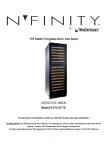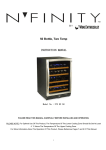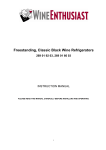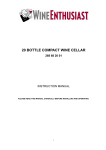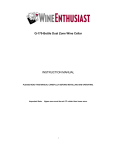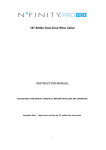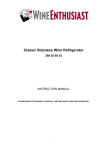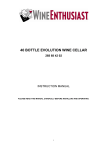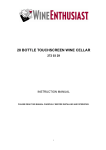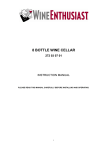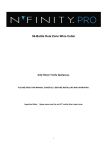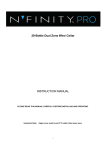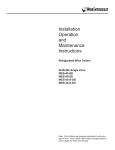Download WineEnthusiast N'Finity 121-Bottle Dual Zone Wine Cellar Instruction manual
Transcript
23 Bottle, Two Temp INSTRUCTION MANUAL Model Number: 273 02 23 PLEASE READ THIS MANUAL CAREFULLY BEFORE INSTALLING AND OPERATING. 1 TABLE OF CONTENTS Chapter Contents Page # Part I. Diagram & Description of Wine Cellar 3 Part II. Important Safety & Pre-Use Instructions 4 Part III. Installation Instructions (a) General Installation Instructions 4 (b) Installation of Built-In Unit 5 Part IV. Operating Your Wine Cellar 6 Part V. Temperature Settings 7 Part VI. Layout & Storage 7-8 Part VII. Removing the Rolling Shelf 8 Part VIII. Care & Maintenance 9 Part IX. Trouble shooting Guide 10 Part X. Technical Information 11 Part XI. Warranty Information 11 2 PART I. DIAGRAM & DESCRIPTION OF WINE CELLAR 3 YOUR WINE CELLAR ALSO INCLUDES THE FOLLOWING: • • • Instruction manual 10 rolling shelves • Two (2) keys Upper hinge • Lower hinge • 4 screws and covers • Hinge cover PART II: IMPORTANT SAFETY INSTRUCTIONS To reduce the risk of fire, electrical shock, or injury when WARNING using your appliance, follow these basic precautions: z Read all instructions before using the wine cellar. z WARNING: Risk of child entrapment. Child entrapment and suffocation are not only problems of the past. Junked or abandoned appliances are still dangerous… even if they will “just sit in the garage for a few days”. z Before you throw away your old wine cellar: 1. Take off the door. 2. Leave the shelves in place so that children may not climb inside easily. z Never allow children to operate, play with, or crawl inside the appliance. z Never clean appliance parts with flammable fluids. The fumes can create a fire hazard or explosion. z Do not store in the vicinity of any other appliance. Do not store near gasoline or any other flammable vapors. The fumes can create a fire hazard or explosion. -Save these instructions- BEFORE USING YOUR WINE CELLAR z Remove the exterior and interior packing. z Before connecting the wine cellar to the power source, let it stand upright for approximately 24 hours. This will reduce the possibility of a malfunction in the cooling system from handling during transportation. z PART III. Clean the interior surface with lukewarm water using a soft cloth. INSTALLATION INSTRUCTIONS (a) General Installation Instructions • This appliance is designed for both free standing and built-in (fully recessed) installation. • Place your wine cellar on a flat, solid floor that is strong enough to support it when it is fully loaded. To level your wine cellar, adjust the front leveling leg at the bottom of the wine cellar. • When moving your wine cellar please do not incline it more than 45 degrees. 4 • Locate the wine cellar away from direct sunlight and sources of heat (stove, heater, radiator, etc.). Direct sunlight may affect the acrylic coating and heat sources may increase electrical consumption. Extreme cold ambient temperatures may also cause the unit to perform improperly. • Avoid locating the unit in damp areas. • Plug the wine cellar into an exclusive, properly installed and grounded wall outlet. Do not under any circumstances cut or remove the third (ground) prong from the power cord. Any questions concerning power and/or electrical grounding should be directed to a certified electrician or authorized products service center. (b) Installation of Built-in Cellar The cutout dimension illustrated in figure (b) allows for door swing and access to the pull-out shelves when installed as a built-in appliance. If installing between frameless cabinets, a ½” wide filler strip or side panel may be needed on hinge side. The filler strip will act as a spacer between the appliance case and adjacent cabinet door swing. Figure C The cutout depth must be 24”. 5 PART IV. OPERATING YOUR WINE CELLAR Each wine cellar includes an operating panel on the front of the unit. This operating panel includes several features to operate and control the temperature of both the upper and lower zones of the wine cellar. The operating panel includes the following features: ON/OFF: Turns the wine cellar on or off. TEMP SET: UPPER ZONE: Adjusts and displays, via LED, the desired temperature (F) of the UPPER zone. TEMP SET: LOWER ZONE: Adjusts and displays, via LED, the desired temperature (F) of the LOWER zone. LIGHT: Turns the interior wine cellar light on or off. BEFORE YOU START: The wine cellar should be placed in a location where the ambient temperature is between 45-80 degrees Fahrenheit. If the ambient temperature is above or below this range, the performance of the unit may be affected. For example, placing your unit in extreme cold or hot conditions may cause interior temperatures to fluctuate. SETTING THE TEMPERATURE CONTROL 1. Make sure power cord is connected to a properly grounded outlet. 2. Turn power ON. 3. Set the temperature of the upper or lower zone as you desire by pushing the UP (+) or DOWN (-) button. When you push the two buttons for the first time, the LED readout will show the original temperature set at previous time (the temperature preset at the factory is 41 °F for the upper and lower zone). • Upper and Lower Zones: The temperature setting can be adjusted between 41°F to 64°F 4. The temperature that you desire to set will increase 1°F if you push the UP(+) button once, and alternatively will decrease 1°F if you push the DOWN (-) button once. 5. Once you have set the desired temperature, wait 5 seconds. The temperature shown in the both Left and Right zone display panels will automatically switch to show the actual temperature inside the unit. The actual temperature will always be shown until the next time you press the UP(+) or DOWN (-) button to change the temperature settings. 6. NOTE: The desired temperatures may fluctuate depending on whether the interior light is ON or OFF and depending on the orientation of the bottles. 6 PART V. TEMPERATURE SETTINGS FOR WINE SERVICE 1. Different varietals of wine require different temperature settings. The recommended temperature ranges for serving different varietals of wine are listed below. Your wine cellar will indicate when you have set the upper and lower zones to the below temperature ranges. • Red Wines: 52 - 64°F • White Wines 44 - 51°F • Sparkling Wines 41 - 43°F 2. If you set the upper or lower zone between 52 - 64°F, the LED light next to “RED” will light up, indicating that you are within the recommended range for serving Red Wines. 3. If you set the upper or lower zone between 44 - 51°F, the LED light next to “WHITE” will light up, indicating that you are within the recommended range for serving White Wines. 4. If you set the upper or lower zone between 41 - 43°F, the LED light next to “SPARKLING” will light up, indicating that you are within the recommended range for serving Sparkling Wines NOTE: z In the event of a power interruption, all previous temperature settings will be automatically saved and each compartment will return to the previous temperature setting. z If the unit is unplugged, loses power, or is turned off, you must wait 3 to 5 minutes before restarting. Attempting to restart the wine cellar before this time has elapsed may prevent the wine cellar from starting. z When you use the wine cellar for the first time or restart the wine cellar after having been shut off for a long time, there will be a few degrees variance between the temperature you select and the one indicated on the LED readout for the first few hours of operation. After a few hours of operation, the temperature will normalize to the displayed temperature. DOOR LOCK z This unit comes with an optional key lock for each door. z The keys are located inside the plastic bag that contains the user manual. To unlock the door, insert the key into the lock and turn counterclockwise. z To lock the door, simply reverse the operation making sure the metal pin is engaged completely. Then remove the key and place it is a secure place for safekeeping. PART VI. LAYOUT AND STORAGE Your cabinet was designed to store a maximum number of bottles securely. We recommend that you observe the tips below to optimize loading. • Disperse your bottles evenly so as not to concentrate weight in any one area. Also, be careful that your bottles do not touch either the back of the cabinet or the step at the bottom. • Make sure that bottles are not all grouped together either at the top or bottom of the cabinet. • Never try to pull out more than one sliding shelf at a time. • Maximum capacity per shelf is 22 lbs. • Each rolling shelf in the upper and lower zone is designed to hold one row of three bottles (see diagram on next page). • 4 bottles per shelf, and 3 on the floor of each compartment, comprise the 23-bottle capacity. Note: when setting bottles on the floor of the unit, Bordeaux (regular) size bottles offer the best fit. 7 PLEASE NOTE Before modifying your cabinet’s original configuration in any way, be sure to ask your dealer for advice. PART VII. REMOVING THE ROLLING SHELF To remove a rolling shelf: 1. Remove all bottles 2. Pull the shelf out as far as possible 3. Push the left side lever downward while pulling right side lever upward (as illustrated below) 4. Remove the shelf 8 PART VIII. CARE AND MAINTENANCE Cleaning Your Wine Cellar z Turn off the power, unplug the appliance, and remove all items including all shelves. z Wash the inside surfaces with warm water and baking soda solution. The solution should be about 2 tablespoons z Wash the shelves with a mild detergent solution. z Wring excess water out of the sponge or cloth when cleaning area of the controls, or any electrical parts. z Wash the outside cabinet with warm water and mild liquid detergent. Rinse well and wipe dry with a clean soft of baking soda with a quart of water. cloth. z Dust the front grill and back of the unit twice yearly. Make sure the power is off before cleaning. z It is recommended to clean the unit completely inside and out once a year to maximize the longevity of the wine cellar. Power Failure z Most power failures are corrected within a few hours and should not affect the temperature of your appliance if you minimize the number of times the door is opened. If the power is going to be off for a longer period of time, you need to take the proper steps to protect your contents. Vacation time z Short vacations: You may leave the wine cellar operating during vacations of less than three weeks. z Long vacations: If the appliance will not be used for several months, remove all items and turn off the appliance. Clean and dry the interior thoroughly. To prevent mold growth, leave the door open slightly, blocking it open if necessary. Moving Your Wine Cellar z Remove all items. z Securely tape down all loose items (shelves) inside your appliance. z Turn the adjustable leg up to the base to avoid damage. z Tape the door shut. z Be sure the appliance stays secure in the upright position during transportation. Also protect the outside of the appliance with a blanket or similar item. Energy saving Tips z The wine cellar should be located in the coolest area of the room, away from heat producing appliances, and away from direct sunlight. 9 PART IX. TROUBLESHOOTING GUIDE Many common issues with your wine cellar can be solved very easily, Try the tips below to troubleshoot your wine cellar should you experience any problems. PROBLEM POSSIBLE CAUSE Wine cellar does not operate. Not plugged in. The appliance is turned off. The circuit breaker tripped or a fuse has blown out. Wine cellar is not cold enough. Check the temperature control setting. External environment may require a higher setting. The door is opened too often. The door is not closed completely. The door gasket is not sealing properly. Wine cellar is turning on and off frequently. The room temperature is hotter than normal. The door is opened too often. The door is not closed completely. The temperature control is not set correctly. The door gasket does not seal properly. The light does not work. Not plugged in. The circuit breaker tripped or a fuse has blown. The light bulb has burned out. The light button is “OFF”. Vibrations. Check to assure that the wine cellar is on a level surface. The wine cellar seems to make too much noise. A faint humming noise may come from the flow of the refrigerator, which is normal. As each cycle ends, you may hear gurgling sounds caused by the flow of refrigerant in your wine cellar. Contraction and expansion of the inside walls may cause popping and crackling noises. The wine cellar is not on a level surface. The door will not close properly. The wine cellar is not on a level surface. The door was reversed and not properly installed. The gasket is dirty. The shelves are out of position. 10 PART X. TECHNICAL DATA 23 Bottle Accommodation 23 (bottles) Type of cooling compressor & air-circulated fan cooling Climate type N Electricity protection grade I Nominal voltage/Frequency 110V-120V/60HZ Rated power(W) 160W 45-80 degrees Fahrenheit Ambient temperature Temperature range Upper and Lower Zone: 41F - 64F Range of inside cabinet humidity 60%RH item weight 93 pounds Item dimension PART XI. 15 W x 26 D X 34 5/8 H WARRANTY INFORMATION Please speak to your retailer before calling Wine Enthusiast if you did not purchase your wine cellar directly from Wine Enthusiast. Limited warranty – 90 day replacement plan with a free 9 month upgrade, totaling 1 year, on parts and labor from the date of shipment. For customer service, please contact Wine Enthusiast by e-mail ([email protected]) or by phone (800.648.6058). The limited warranty does not cover: Damage due to such things as accident, misuse, abuse, mishandling, neglect, unauthorized repair or any other cause beyond the control of the seller whether similar or dissimilar to the foregoing. Purchaser understands and acknowledges that the goods sold here are wine refrigerators, which house wine. Purchaser assumes all the risk of using these units, including risk of spoilage, humidity variations, temperature variations, leaks, fires, water damage, mold, mildew, dryness and similar perils that may occur. 11











